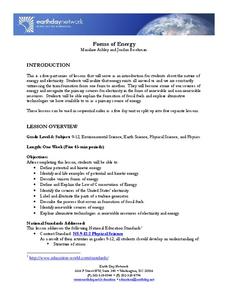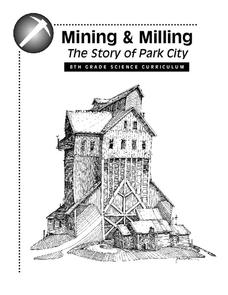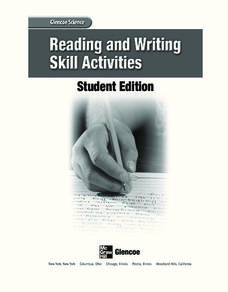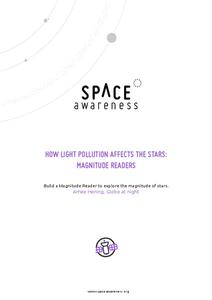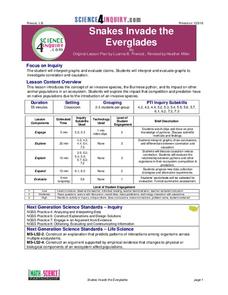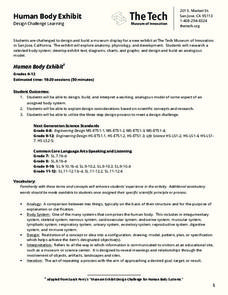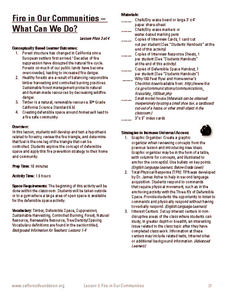University of Colorado
Are All Asteroids' Surfaces the Same Age?
Did you know scientists can tell the age of an asteroid by looking closely at its craters? This final lesson of a six-part series focuses on two asteroids, Gaspra and Ida, in order to demonstrate the concept of dating asteroids. Scholars...
Baylor College
How Do We Use Water?
Send youngsters home to survey how they use water in their homes. Then bring them together to discuss which uses are essential for our health and which are not. A helpful video offers teaching tips for this lesson, and a presentation...
Cornell Lab of Ornithology
Investigating Evidence
Explore the scientific process through nature. Scholars become scientists as they develop a question, design an experiment, collect data, and analyze their results. A two-week lesson guides your classes through the process and provides...
Science Friday
Microorganisms on the Move
You can't b. cereus until you see this lesson! Young microbiologists learn to prepare deep well slides, observe two types of microorganisms, and compare and contrast their physical characteristics in this interactive and lively activity.
Earth Day Network
Forms of Energy
Give me a home where electric buffalo roam and I'll show you an ohm on the range. Introduction your classes to potential and kinetic energy, electricity, and renewable resources with a resource that combines observation, direct...
University of Colorado
Patterns and Fingerprints
Human fingerprint patterns are the result of layers of skin growing at different paces, thus causing the layers to pull on each other forming ridges. Here, groups of learners see how patterns and fingerprints assist scientists in a...
Baylor College
Microbes Are Everywhere
In a nutshell, your class will culture bacteria from their choice of surfaces. You will need to prepare or purchase agar plates. If you are new to this classic biology activity, this resource carefully walks you through the process of...
Park City Historical Society & Museum
Mining and Milling: The Story of Park City
Study the chemistry of mining! Through nine lessons in the unit, learners explore different concepts related to mining. Their study ranges from rock and mineral analysis to the environmental impact of dynamite and the chemical reaction...
Science Friday
Capturing Carbon Dioxide
Why don't we just capture carbon dioxide in the air and store it somewhere else? A hands-on lesson allows scholars to explore a complex concept. First, they will create a carbonated beverage, and then they will determine...
Wild BC
Bearly Any Ice
After reviewing food chains, your class members participate in an arctic predator-prey game that exemplifies the impact of climate change of food availability. If you are in a hurry, skip this lesson, but if you have the time to...
Curated OER
Reading and Writing Skills Activities
A straightforward and thorough packet of reading exercises would be a solid addition to any reading unit. With worksheets that address various writing and reading skills, including word roots, narrative writing, evaluating text, and...
Space Awareness
How Light Pollution Affects the Stars: Magnitude Readers
Did you know light can decrease visibility? Light pollution absolutely makes it more difficult to see stars. Scholars build a simple magnitude reader to determine the magnitude of stars. They use these data to estimate the impact of...
Science 4 Inquiry
Snakes in the Everglades
The Burmese python is on the loose ... and he's hungry! Illustrate the differences between causative and correlative relationships through an inquiry instructional activity. Pupils examine several sources of information to determine if...
Curated OER
Teaching Biology Through Bioinformatics
Wow! A very detailed slideshow covers complex topics of genome research methods. This is advanced and relevant to the highest level of school biology. Excellent resource if you wish to expose your class to scientific methods and...
Forest Foundation
Fire - How Does it Relate to You?
Forest fires can be a necessary step in keeping a forest healthy, but what happens when they get out of control? Learners investigate the causes and effects of forest fires in two specific areas, culminating in a report about the ways...
Indian Land Tenure Foundation
A Leadership Chart
It's important for children to understand how they fit into their local or social community. They discuss leadership and who exemplifies a leader in their family, community, and school. Each child will create a quilt square by...
Safe Drinking Water Foundation
To Filter or Not to Filter
Drinking clean water can be taken for granted. Explore the process and high cost of filtering water with a water pollution and filtration activity. Young scientist build a filtration system to filter polluted water, examine the economics...
Teach Engineering
Above-Ground Storage Tank Design Project
The challenge: determine whether a tank will float. A design activity has groups work as engineering teams in order to determine the stability of given tanks and liquid contents. The teams need to determine the equations to...
Tech Museum of Innovation
Human Body Exhibit
Explore human anatomy and physiology using models. Scholars study systems of the human body and design a display for a museum exhibit. To complete the activity, individuals create analogous models of their chosen human body systems.
Google
Snapchat Geofilter
Sometimes pictures could use a little help. Scholars add filters, frames, stamps, and text to a background photograph. They learn to use variables, encapsulation, sequences, and objects as they use the Blockly programming language.
California Academy of Science
Our Hungry Planet: Design Thinking Challenge
Scholars investigate an issue associated with food systems and design their own solutions. Working collaboratively, they follow each step in the design process to complete the 10th lesson of the 13-part Our Hungry Planet series.
Bonneville
Illuminate Me: Merging Conductive Sewing, Technology, and Solar Power
Sew up a unit on solar energy with a hands-on project. Groups sew LED lights on clothing using conductive thread. Solar modules attached to a helmet provide the energy for the lights. A final presentation gives learners the opportunity...
Curated OER
Introduction to Flight: A Math, Science and Technology Integrated Project
Seventh graders review graphing procedures and practice locating points using x,y coordinates. Students calculate the areas of the top and bottom surfaces of the airfoil. They construct a test model of the airfoil.
Forest Foundation
Fire in Our Communities - What Can We Do?
Learn about defensible space and renewable resources with a lesson about forest fires. After exploring the ways that humans have impacted the environment, kids conduct mock interviews about differing points of view in the conservation...
Other popular searches
- 4th Grade Science Project
- Physical Science Projects
- Science Project on Pulleys
- Science Project Volcano
- Science Project Gravity
- Science Project Ideas
- Forensic Science Project
- Science Fair Project Ideas
- Rock Science Project
- Science Project Food
- Science Project Terrarium
- Science Fair Project Data




